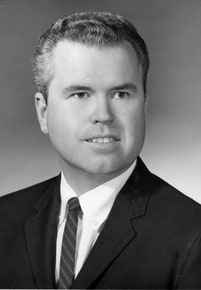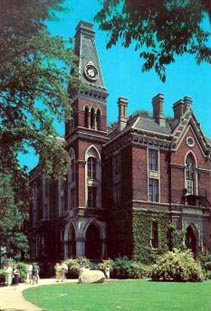Prof. Thomas Fitzpatrick to Head Freiburg Program
November 30, 1967
 November 30, 1967, Greencastle, Ind. — Thomas Fitzpatrick, assistant professor of voice and director of admissions counseling in the DePauw University School of Music, will serve as resident director of DePauw's 1969 Freiburg study abroad program, President William E. Kerstetter announced today. Fitzpatrick will be responsible for the overseas program in cooperation with William Petrek, director of international study at DePauw.
November 30, 1967, Greencastle, Ind. — Thomas Fitzpatrick, assistant professor of voice and director of admissions counseling in the DePauw University School of Music, will serve as resident director of DePauw's 1969 Freiburg study abroad program, President William E. Kerstetter announced today. Fitzpatrick will be responsible for the overseas program in cooperation with William Petrek, director of international study at DePauw.
President Kerstetter says Fitzpatrick brings to the current reorganization of the Freiburg program a wealth of talent and imaginative interest in cultural matters.
In 1952-53, Fitzpatrick was the recipient of a Fulbright scholarship to Italy for a year of study and performance at the Rome Opera Theatre. After completion of his grant, Fitzpatrick remained in Europe for another 18 months, performing concerts in Germany and Austria.
After returning to the United States and prior to joining DePauw's faculty in 1963, Fitzpatrick combined concert work and teaching. He taught at the Cosmopolitan School of Music in Chicago and at Wisconsin State University in Stevens Point. The tenor's  concert work included both symphonic work -- with such orchestras as the Chicago Symphony -- and operatic work with theatre companies in Chicago, Denver, Dallas and at Indiana University. He has also made extensive appearances on television.
concert work included both symphonic work -- with such orchestras as the Chicago Symphony -- and operatic work with theatre companies in Chicago, Denver, Dallas and at Indiana University. He has also made extensive appearances on television.
At DePauw, Professor Fitzpatrick has taught voice, diction classes in four languages, and has presented numerous concerts. It is anticipated that during his residence in Europe with the Freiburg he will give several performances.
Fitzpatrick has a B.A. from St. Ambrose College, his B.M. from the Juilliard School of Music, an Artist Diploma from Teatro Lirico Sperimentale in Rome, and an M.M. from Indiana University.
The 1969 Freiburg program will follow the general structure of the 1968 program. Consisting of four parts, its theme will be understanding the European community in political, economic and cultural terms.
Learn more in this previous story.
Back